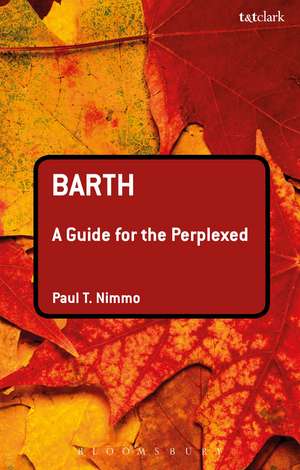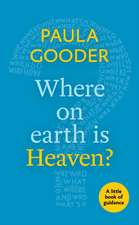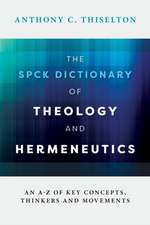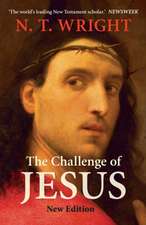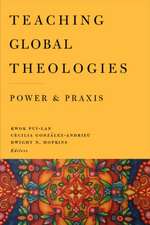Barth: A Guide for the Perplexed: Guides for the Perplexed
Autor Professor Paul T. Nimmoen Limba Engleză Paperback – 11 ian 2017
| Toate formatele și edițiile | Preț | Express |
|---|---|---|
| Paperback (1) | 171.85 lei 6-8 săpt. | |
| Bloomsbury Publishing – 11 ian 2017 | 171.85 lei 6-8 săpt. | |
| Hardback (1) | 537.95 lei 6-8 săpt. | |
| Bloomsbury Publishing – 11 ian 2017 | 537.95 lei 6-8 săpt. |
Din seria Guides for the Perplexed
- 14%
 Preț: 164.68 lei
Preț: 164.68 lei - 14%
 Preț: 163.34 lei
Preț: 163.34 lei - 14%
 Preț: 179.10 lei
Preț: 179.10 lei -
 Preț: 145.10 lei
Preț: 145.10 lei - 14%
 Preț: 133.15 lei
Preț: 133.15 lei -
 Preț: 166.82 lei
Preț: 166.82 lei - 14%
 Preț: 170.50 lei
Preț: 170.50 lei - 24%
 Preț: 150.50 lei
Preț: 150.50 lei - 8%
 Preț: 145.90 lei
Preț: 145.90 lei -
 Preț: 178.12 lei
Preț: 178.12 lei - 15%
 Preț: 163.01 lei
Preț: 163.01 lei - 14%
 Preț: 165.03 lei
Preț: 165.03 lei - 8%
 Preț: 157.75 lei
Preț: 157.75 lei - 14%
 Preț: 164.93 lei
Preț: 164.93 lei - 14%
 Preț: 164.76 lei
Preț: 164.76 lei - 22%
 Preț: 164.31 lei
Preț: 164.31 lei - 9%
 Preț: 156.88 lei
Preț: 156.88 lei - 15%
 Preț: 162.99 lei
Preț: 162.99 lei - 22%
 Preț: 565.55 lei
Preț: 565.55 lei - 13%
 Preț: 256.49 lei
Preț: 256.49 lei - 14%
 Preț: 163.87 lei
Preț: 163.87 lei - 19%
 Preț: 158.90 lei
Preț: 158.90 lei - 19%
 Preț: 170.25 lei
Preț: 170.25 lei - 22%
 Preț: 595.65 lei
Preț: 595.65 lei -
 Preț: 215.33 lei
Preț: 215.33 lei - 22%
 Preț: 712.64 lei
Preț: 712.64 lei - 14%
 Preț: 164.13 lei
Preț: 164.13 lei - 14%
 Preț: 164.76 lei
Preț: 164.76 lei - 14%
 Preț: 145.10 lei
Preț: 145.10 lei - 14%
 Preț: 144.83 lei
Preț: 144.83 lei - 22%
 Preț: 595.32 lei
Preț: 595.32 lei - 20%
 Preț: 190.50 lei
Preț: 190.50 lei - 14%
 Preț: 176.25 lei
Preț: 176.25 lei - 14%
 Preț: 163.08 lei
Preț: 163.08 lei - 22%
 Preț: 567.17 lei
Preț: 567.17 lei - 20%
 Preț: 177.77 lei
Preț: 177.77 lei - 22%
 Preț: 770.86 lei
Preț: 770.86 lei - 14%
 Preț: 163.96 lei
Preț: 163.96 lei - 22%
 Preț: 946.89 lei
Preț: 946.89 lei - 14%
 Preț: 145.01 lei
Preț: 145.01 lei - 20%
 Preț: 176.25 lei
Preț: 176.25 lei - 14%
 Preț: 595.17 lei
Preț: 595.17 lei
Preț: 171.85 lei
Preț vechi: 199.24 lei
-14% Nou
Puncte Express: 258
Preț estimativ în valută:
32.89€ • 34.21$ • 27.15£
32.89€ • 34.21$ • 27.15£
Carte tipărită la comandă
Livrare economică 15-29 aprilie
Preluare comenzi: 021 569.72.76
Specificații
ISBN-13: 9780567032645
ISBN-10: 0567032647
Pagini: 224
Dimensiuni: 138 x 216 x 28 mm
Greutate: 0.32 kg
Editura: Bloomsbury Publishing
Colecția T&T Clark
Seria Guides for the Perplexed
Locul publicării:London, United Kingdom
ISBN-10: 0567032647
Pagini: 224
Dimensiuni: 138 x 216 x 28 mm
Greutate: 0.32 kg
Editura: Bloomsbury Publishing
Colecția T&T Clark
Seria Guides for the Perplexed
Locul publicării:London, United Kingdom
Caracteristici
Makes an ideal upper level introduction to the most important theologian of the 20th century
Notă biografică
Paul T. Nimmo is King's Professor of Systematic Theology at the University of Aberdeen, UK.
Cuprins
AcknowledgementsForewordAbbreviationsChapter I: Introduction: The Life and Work of Karl Barth Chapter II: The Doctrine of the Word of God Chapter III: The Doctrine of God Chapter IV: The Doctrine of Creation Chapter V: The Doctrine of Reconciliation - I Chapter VI: The Doctrine of Reconciliation - II Chapter VII: Theological Ethics Chapter VIII: ConclusionFurther ReadingIndex
Recenzii
Karl Barth: A Guide for the Perplexed is an excellent introduction to Barth's work for those who may be daunted by the scope of his writing, as well as a handy reference for further study. However, only to read even this most artful summary is to miss the power of Barth's thought. Use this book not as a replacement for the Church Dogmatics, but as a springboard into the text itself, where innumerable delights and wonders await you.
Nimmo has given us an extremely well written and scholarly book in order to help us to understand a theologian of great magnitude. As a short book, it provides one of the best-summarized treatments of Barth and his thought that is currently published. Nimmo is careful to ground his explanation of Barth's theology in its proper historical context.
This is a sure-footed, careful, and deeply sympathetic guide to Barth's theology. Anyone new to Barth will find an invaluable starting point in Nimmo's account of the content (and also the style and structure) of Church Dogmatics. Seasoned Barth scholars will recognize the depth of knowledge behind Nimmo's skillful summary, and the deft, balanced way that he touches on controversial issues. Here is a book to which anyone can turn for a trustworthy and accessible overview of the magnum opus of one of the most influential theologians of the 20th century.
Paul Nimmo's book is a gift to readers of Karl Barth's Church Dogmatics. His clear and judicious exposition of Barth's great work, combined with reliable and illuminating commentary on each section, provides an unusually helpful introduction to Barth's magnum opus.
Paul Nimmo delivers a wonderfully compact and accessible introduction to Karl Barth's thought in all its scope. He lays out the structure of the Church Dogmatics and the doctrine of reconciliation in accessible schemes, and his commentary on Barth's treatment of classical theological doctrine speaks directly to contemporary readers. This will be my go-to text for students and pastors looking to gain a foothold in understanding the depth and breadth of Barth's theology.
Paul Nimmo has provided us with a truly magnificent introduction to Karl Barth that will serve students for decades to come. The highlight is Nimmo's brilliant summary of the central arguments and underlying logic of Barth's Church Dogmatics. This clear, concise, and charitable account is complemented by incisive commentary that takes the reader again and again to the heart of the matter. One can hardly imagine a better introduction to place in the hands of a new reader of Barth's theology.
Karl Barth's Church Dogmatics is an intricate, dialectic, symphonic work of staggering length, nuance, and insight. And yet, the complexity of the Church Dogmatics and the ever increasing volume of secondary literature makes reading, teaching, and engaging Barth with nuance and precision a daunting task. Like a master teacher, Paul Nimmo's Barth: A Guide for the Perplexed offers a clear and lucid introduction to the structure, theological arguments, and dialectic of Karl Barth's Church Dogmatics. In addition to guiding students, ministers, teachers and scholars through the complex theological terrain of Barth's magnum opus, Nimmo regularly presents insightful and penetrating analysis on Barth's thinking and its place in the history and ongoing work of theological reflection. There is simply no better introduction to Barth's Church Dogmatics than Nimmo's book and I anticipate it will become a standard in classrooms and studies alike.
Paul Nimmo's book bears the hallmarks of Barth scholarship at its best: a keen eye for detail, an appreciation of Barth's willingness to rethink and recast established doctrinal loci, and - to my mind most importantly - a keen interest in Barth's significance for constructive reflection today. Readers familiar with the Dogmatics will benefit from Nimmo's even-handed and careful analysis; those who are new to Barth's masterpiece will find in Nimmo an exemplary guide.
Nimmo has given us an extremely well written and scholarly book in order to help us to understand a theologian of great magnitude. As a short book, it provides one of the best-summarized treatments of Barth and his thought that is currently published. Nimmo is careful to ground his explanation of Barth's theology in its proper historical context.
This is a sure-footed, careful, and deeply sympathetic guide to Barth's theology. Anyone new to Barth will find an invaluable starting point in Nimmo's account of the content (and also the style and structure) of Church Dogmatics. Seasoned Barth scholars will recognize the depth of knowledge behind Nimmo's skillful summary, and the deft, balanced way that he touches on controversial issues. Here is a book to which anyone can turn for a trustworthy and accessible overview of the magnum opus of one of the most influential theologians of the 20th century.
Paul Nimmo's book is a gift to readers of Karl Barth's Church Dogmatics. His clear and judicious exposition of Barth's great work, combined with reliable and illuminating commentary on each section, provides an unusually helpful introduction to Barth's magnum opus.
Paul Nimmo delivers a wonderfully compact and accessible introduction to Karl Barth's thought in all its scope. He lays out the structure of the Church Dogmatics and the doctrine of reconciliation in accessible schemes, and his commentary on Barth's treatment of classical theological doctrine speaks directly to contemporary readers. This will be my go-to text for students and pastors looking to gain a foothold in understanding the depth and breadth of Barth's theology.
Paul Nimmo has provided us with a truly magnificent introduction to Karl Barth that will serve students for decades to come. The highlight is Nimmo's brilliant summary of the central arguments and underlying logic of Barth's Church Dogmatics. This clear, concise, and charitable account is complemented by incisive commentary that takes the reader again and again to the heart of the matter. One can hardly imagine a better introduction to place in the hands of a new reader of Barth's theology.
Karl Barth's Church Dogmatics is an intricate, dialectic, symphonic work of staggering length, nuance, and insight. And yet, the complexity of the Church Dogmatics and the ever increasing volume of secondary literature makes reading, teaching, and engaging Barth with nuance and precision a daunting task. Like a master teacher, Paul Nimmo's Barth: A Guide for the Perplexed offers a clear and lucid introduction to the structure, theological arguments, and dialectic of Karl Barth's Church Dogmatics. In addition to guiding students, ministers, teachers and scholars through the complex theological terrain of Barth's magnum opus, Nimmo regularly presents insightful and penetrating analysis on Barth's thinking and its place in the history and ongoing work of theological reflection. There is simply no better introduction to Barth's Church Dogmatics than Nimmo's book and I anticipate it will become a standard in classrooms and studies alike.
Paul Nimmo's book bears the hallmarks of Barth scholarship at its best: a keen eye for detail, an appreciation of Barth's willingness to rethink and recast established doctrinal loci, and - to my mind most importantly - a keen interest in Barth's significance for constructive reflection today. Readers familiar with the Dogmatics will benefit from Nimmo's even-handed and careful analysis; those who are new to Barth's masterpiece will find in Nimmo an exemplary guide.
